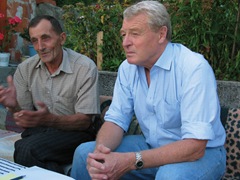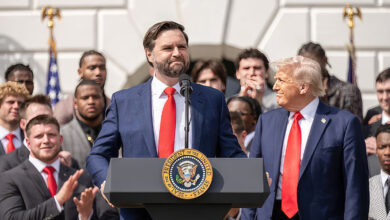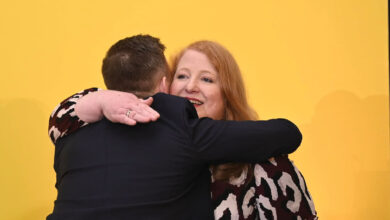A varied life: Paddy Ashdown interview
 A vaccum is Northern Ireland’s greatest danger, Paddy Ashdown reflected as he recalled his local childhood and shared his views on Bosnia, Afghanistan and the coalition. Peter Cheney talked to the former Lib Dem leader.
A vaccum is Northern Ireland’s greatest danger, Paddy Ashdown reflected as he recalled his local childhood and shared his views on Bosnia, Afghanistan and the coalition. Peter Cheney talked to the former Lib Dem leader.
As his autobiography indicates, Paddy Ashdown has led a fortunate life – indeed a varied one. Born in India in 1941, and brought up in Northern Ireland and England, he spent 13 years in the Royal Marines, including as commander of a commando company in Belfast. Four years in the Foreign Office and MI6 followed before being a businessman and youth worker. His political career has included 18 years as MP for Yeovil, a
decade leading the Liberal Democrats and a peerage since 2001.
Irish roots run deep in his family history and, having lived in Donaghadee and Comber as a child, he counts himself “with great pride to be a Northern Irish man”. His mother, a Protestant, hailed from “Rathfriland on the hill” near Newry while his father’s ancestry was southern Catholic.
Daniel O’Connell was among his forefathers; O’Connell’s daughter went to India where she met Ashdown’s great- grandfather.
“It seems that even from my earliest childhood, ethnic and religious division seems to have run through like an underground stream through my life,” he surmised. His first childhood memory was going through a train station in Punjab which was covered with the remains of a massacre.
His mixed marriage childhood put him off organised religion but he does have a faith: “To be honest, I call myself a Christian but I am not prepared to let people put names on it. I pray every night. I do believe in God but I don’t like going into churches. My God is a very private God.”
Northern Ireland’s countryside, though, did have a good influence while he lived there from ages four to 11. “It gave me a wonderful sense of appreciation of the outdoor life,” he remarked, recalling wildfowling in Strangford Lough, fishing in Lough Island Reavy and poaching on Holywood reservoir.
The height of his career came after leaving the Commons, when he served as Bosnia’s High Representative from 2002 to 2006. The role involved overseeing the country’s two separate governments: one for the Serbs and the other for the Bosnian Muslims and Croats.
Ashdown was an early supporter of military action to end the Bosnian War, and clearly enjoyed his time in the country.
“I was very privileged to help construct a stable peace and indeed we made very great progress,” he commented. He was speaking just after the Serbian part’s president threatened to secede from the country.
Fifteen years after the Dayton peace agreement, he did not expect it to go back to conflict but thinks the international community has “forgotten about Bosnia”. On leaving the country, Ashdown was congratulated but had warned that other countries were “not paying attention” to its problems.
“I said I thought it would be a complete disaster, which is largely what happened and I am very, very worried about it.”
A similar job beckoned in Afghanistan but President Karzai opposed his appointment in 2008. Ashdown, though, does keep up a strong interest in the country and can see a way out of the war.
“This was not a war we had to lose,” he commented. “The public were with us in Afghanistan and they’re still with us. We are not the Russian invaders but we have made mistake after mistake.”
Under General Petraeus, he said the right military strategy is being pursued i.e. to “dig, hold and rebuild” rather than chasing the enemy. Ashdown was starting to see “circumstances in which we could turn the military balance in our favour” but added: “In these wars, if we win militarily but lose politically, we lose.”
Afghanistan, he pointed out, could not be turned into a centralised western country and the writ of Kabul and Karzai was, anyway, “diminishing.” Talks with the Taliban were possible but “if you don’t keep the military pressure on, you won’t be able to negotiate peace.”
Drawing a local comparison, he said: “The deal with the Taliban is the same as the deal with the IRA.” Grievances could be understood and political points argued “within the constitution, not outside it.” A
regional agreement, in his view, was also needed to guarantee the country’s borders.
Northern Ireland
Closer to home, he could have become the first Secretary of State to have grown up in Northern Ireland, but turned down Gordon Brown’s offer in June 2007.
Asked if he would have wanted the job, he replied: “Of course I did and would have loved to take it on but, hang on, you’re a member of the Cabinet and that means you have to observe Cabinet solidarity.”
When they discussed Labour policies Ashdown would oppose, Brown’s response, he claims, was: “Couldn’t you keep quiet?” Ashdown added that he “never had a huge hankering to be a government Minister” and had “made worse judgements”.
He had already started work on the Strategic Review of Parading, where he was proud to give something back to “a country of my blood if not my birth.” The review group’s work was quiet – “we never blew our trumpet about it” – and he described its members as “some of the finest individuals I have worked with anywhere” because of their leadership and courage.
“My hope has always been that Northern Ireland continues to make progress – and slow at times, faster at other times – but to a solid, secure peace based on partnership and power-sharing. I think it leads the way in that solution for others,” he stated.
“I think that Northern Ireland can genuinely be a genuine beacon in future for the resolution of conflict and God knows we need it.”
The main danger, in contrast, is when that progress stalls: “Vacuums are always deadly [to Northern Ireland]. They give the forces of destruction the space to do their worst. That’s why it’s so important always keep things moving forward.”
Going into government has not yet paid off for the Liberal Democrats, with their popularity falling since the coalition was form. Ashdown, though, was optimistic, even enthusiastic, about its prospects.
“I was the founding leader of this party.
I always used to argue to the party that liberalism is too important to be confined to a cosy, light, fluffy think tank of new ideas on the edges of politics which people then rob from you,” he remarked.
Liberal Democrats had already seen some of their goals implemented under Labour e.g. devolution, freedom of information and the Human Rights Act. They had also ruled in coalition governments in Scotland (1999-2007) and Wales (2000-2003).
“Will this succeed? I cannot promise that. It will succeed if we govern well. It won’t if we don’t.”
He foresees the Liberal Democrats helping the UK “through a real crisis” and also putting some of their policies into practice, though they will not always agree with the Tories.
It was put to him that junior coalition parties tend to lose out, as is happening to the Greens in the Republic.
“If you fail, the junior partner loses out. If you succeed, it doesn’t,” he replied, dismissing the current UK opinion polls.
“The point is: ‘How does this play out in four years’ time?’ I am very clear that if you are seen to have governed Britain well in the partnership and then present yourselves to the people as people who have experience in government, the party will not do badly out of that. The party will do well.”
The Rathfriland connection
Paddy Ashdown’s grandfather, RJ Hudson, lived in the town’s Dromore Street and was a newsagent, bookseller, toy merchant and auctioneer. He arranged a weekly dancing class at the market house, possessed a well-stocked library and purchased one of County Down’s first motorcars which had to zig- zag up the steep hill on the way home. His story was recorded by Mrs Edith M Clarke in her popular local history, ‘City Set on a Hill’ (1979).






